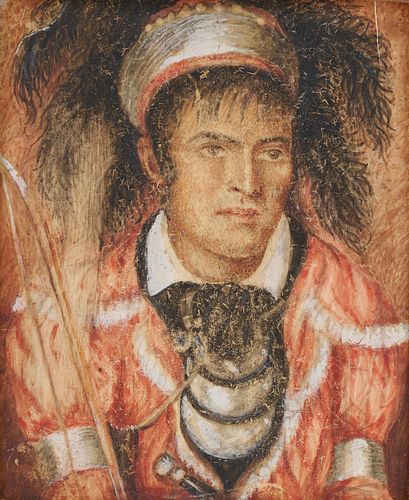Lot 230
1830 Tennessee Portrait Miniature of Kinheche, Chickasaw Indian
Estimate: $10,000 - $12,000
Sold for
$60,000
Sold Price includes BP
Bid Increments
| Price | Bid Increment |
|---|---|
| $0 | $10 |
| $100 | $25 |
| $500 | $50 |
| $1,000 | $100 |
| $3,000 | $200 |
| $5,000 | $500 |
| $10,000 | $1,000 |
| $20,000 | $2,000 |
| $50,000 | $5,000 |
| $100,000 | $10,000 |
Caroline Dudley (Tennessee, 1802-1832) important watercolor miniature portrait painting, depicting Chickasaw Native American dignitary Kinheche in bright garb and headdress holding a bow and arrow. Inscription identifying subject as "Kinhichi", en verso or interior paper liner, and as "Kinhishee" on the exterior of the back of the frame. Housed in a wooden frame with gilt metal sight edge and oak leaf hanger. Sight: 2 3/4" H x 2 1/4" W. Framed: 6" H x 5" W. Circa 1830. Note: this portrait was painted in Franklin, Tennessee in August of 1830 during the landmark treaty summit between President Andrew Jackson and the Chickasaw Nation, conducted at the city's Masonic Hall. Caroline Dudley was the daughter of a prominent Middle Tennessee settler and leader, Guilford Dudley; both were among the spectators invited to witness the treaty event. According to family history, Miss Dudley was so impressed by the appearance of Kinheche or Kin-hee-shee (who according to some accounts may have been a son of the chief), that she was inspired to paint his likeness. Miss Dudley may have been a teacher of art or other similar subjects at the Young Ladies Boarding School run by her mother, Anna Bland Eaton Dudley on the West Harpeth River in Williamson County from 1809-1840 or at Mrs. Long's School on West Main Street in Franklin, which was run by her sister, Judith from 1826-1828 and 1834-37. After Caroline Dudley's death just two years later at the age of 30, the painting was inherited by her sister Frances and descended in the family to its last private owner, Mary Bright Wilson of Lincoln County, Tennessee. Historical background: "After his Indian Removal Act was passed in May of 1830, President Andrew Jackson invited the Chickasaw Nation to a treaty council to be held the following August in Franklin, Tennessee. During their stay, the Chickasaw delegation met Jackson in the Franklin Masonic Hall, a National Historic Landmark which still stands at 115 2nd Ave South in Franklin. This would be the first treaty negotiation under the Removal Act and a successful outcome was important to the President, who was a charismatic and influential figure among the Chickasaw. Some of the older minkos (chiefs or headmen) had served under Jackson's command at the Battle of New Orleans and the Creek War, during the War of 1812. They called him "Sharpe Knife". Jackson appointed John Coffee and John Eaton as treaty commissioners. Coffee was a long time friend who had also served with Jackson in 1812. Eaton, Jackson's Secretary of War, lived in Franklin. The Chickasaw delegation was led by Levi Colbert - Itawambe Miko (Bench Chief), and included George Colbert, James Colbert, John McLish, Captain William McGilvery, Captain James Brown, Isaac Alberson, Topulka, Ishtayatubbe, Ahtokowa, Hushtatabe, Innewakche, Oaklanayaubbe, Ohekaubbe, Immolasubbe, Immohoaltatubbe, Ishtekieyokatubbe, Ishtehiacha, Inhiyouchetubbe, and Kinheche..." President Jackson met and welcomed the Chickasaw delegation when they arrived in Franklin on August 20, 1830. During the next several days, support for Chickasaw education, Removal expenses, and other related details were worked out. On August 31 the treaty was signed. The Chickasaw agreed to exchange their remaining land in Mississippi and Alabama for land "West of the territory of Arkansaw", with a stipulation that they could examine the land beforehand. If they didn't find suitable land, the treaty would be null and void. A supplemental treaty concerning other details was signed the next day, September 1, and "thereupon, the council broke up." The Chickasaws sent several delegations west of the Mississippi to look for land over the next two years, but nothing suitable was found. In the meantime, the signing of the 1830 Franklin treaty caused a land rush of white squatters anxious to stake their claims before the Chickasaws had even left. By 1832 the Chickasaw Nation was being overrun, even though the Franklin treaty was supposed to prohibit such intrusions. Article 3 extended the protection of the United States to the Chickasaws, but the federal government did nothing to stop the invading squatters - apparently Jackson had let his blade grow dull, at least when it came to protecting Chickasaw land. Since the Chickasaws found no suitable land in the west, the Franklin treaty was considered null and void and was never ratified by Congress. In October, 1832, President Jackson sent John Coffee to the Chickasaw Nation to negotiate a new treaty. Coffee met 65 Chickasaw leaders at the Chickasaw council house on Pontotoc Creek, near present day Tupelo, Mississippi. On October 20, the Chickasaw leaders signed the Treaty of Pontotoc Creek with the United States, agreeing to sell their remaining homeland in Mississippi and Alabama. The Chickasaws became dissatisfied with the Treaty of Pontotoc Creek, believing John Coffee had misrepresented the terms during the negotiations. In 1834 they sent a delegation to Washington, D.C., to amend the treaty. Levi Colbert, then 75 years old, began the journey but became ill and died. Before his death he dictated instructions for the delegation, which included his brother George, who had also been present at the Franklin treaty council. George Colbert and the rest of the delegation then traveled on to Washington and negotiated the desired amendments. In 1837, under the provisions of the Treaty of Doaksville, a treaty between the Chickasaw and Choctaw Nations, the Chickasaw bought a section of Choctaw land in Indian Territory. The people whose allegiance and friendship arguably prevented the destruction of fledgling Nashville and the other Cumberland settlements, and helped shape the map of the southeast to the benefit of the United States, finally left the soil of their birth and removed to the west." Source: The Native American History Association (http://www.nativehistoryassociation.org/franklin_treaty.php)
Property of the Lincoln County Museum, Fayetteville, TN; Bequest of Mary Bright Wilson (1909-2004), formerly of Fayetteville, and descended in her family.
1" separation to upper right edge (near corner), otherwise overall good condition. Frame is old, but may or may not be original.
Property of the Lincoln County Museum, Fayetteville, TN; Bequest of Mary Bright Wilson (1909-2004), formerly of Fayetteville, and descended in her family.
Condition
The UPS Store of Bearden 865-584-0081 (press 5), fax 865-584-0094 store2630@theupsstore.com Click to get a quote
The UPS Store of Northshore Knoxville Contact – Eve 865-951-2499 store6461@theupsstore.com
John & Max Express LLC NOTE: large items & white glove delivery services only (driving range limitations may apply) Contact – Dina 865-230-1568 johnmaxexpress@gmail.com


















